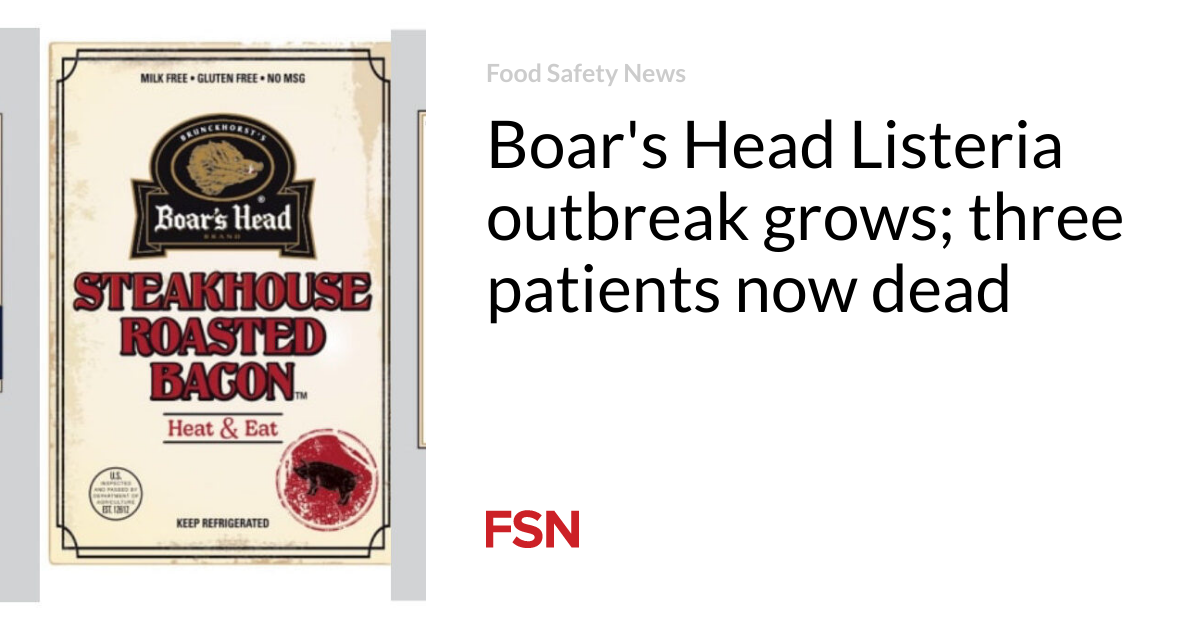Food
The Boar’s Head Listeria outbreak is growing; three patients have now died

A Listeria outbreak traced to Boar’s Head meats has claimed another life and sickened more people.
As of August 8, there were 43 confirmed patients in 13 states. All patients required hospitalization. Three of the patients have died. The patients range in age from 32 to 94 years old.
“Epidemiological, laboratory and traceback data show that meats cut in delis, including Boar’s Head brand liverwurst, are contaminated with Listeria and are making people sick,” according to an update from the Centers for Disease Control and Prevention.
Boar’s Head has recalled more than 7 million pounds of products due to the outbreak.
The recalled products have a shelf life of 44 days and were not produced until July 17. There are concerns that consumers may have recalled processed meats in their homes. The recalled products can be identified by certain codes on the USDA inspection mark, such as “EST. 12612” or “P-12612” on product labels.
Cooling and freezing do not kill Listeria bacteria. Heating to an internal temperature of 165 degrees F or until steaming hot kills Listeria.
“The actual number of sick people in this outbreak is likely higher than the reported number, and the outbreak may not be limited to states with known illnesses. This is because some people recover without medical care and are not tested for Listeria. In addition, recent illnesses may not yet be reported, as is usually the case 3 to 4 weeks to determine if a sick person is part of an outbreak,” the CDC said.
Specific tests are needed to diagnose Listeria infections, which can mimic other diseases. Anyone who has become ill after eating Boar’s Head Deli meat should seek medical attention and ask to be tested for Listeria.
So far, public health investigators have interviewed 34 of the outbreak patients. Of these patients, 32 reported eating processed meats before becoming ill. Thirty of them reported eating sliced meat in a deli. Two couldn’t remember if their meat had been cut in a deli. According to the CDC, the affected meats were sliced at various supermarket and supermarket delis.
Outbreak investigators in two states have found Listeria in Boar’s Head meats. The Maryland Department of Health and Baltimore City Health Department collected an unopened Boar’s Head liverwurst product from a store and identified Listeria monocytogenes. The New York State Food Laboratory also identified Listeria monocytogenes from a sample of unopened Boar’s Head liverwurst products collected by the New York State Department of Agriculture and Markets Division of Food Safety and Inspection from retail stores. Whole genome sequencing showed that both were the same strain that made people sick during this outbreak.
Products sold at delis, especially those that are cut or prepared in the deli, may be contaminated with Listeria. Listeria spreads easily under deli equipment, surfaces, hands and food. Refrigeration will not kill Listeria, but reheating it to a high enough temperature before eating will kill any germs on this meat.
Consumers who have had the recalled meat products at home should do so beautiful their refrigerators, containers and surfaces that may have touched the meat or its packaging.
About Listeria infections
Food contaminated with Listeria monocytogenes may not look or smell putrid, but it can still cause serious and sometimes life-threatening infections. Anyone who has eaten recalled products and developed symptoms of a Listeria infection should seek medical attention and tell their doctor about possible Listeria exposure.
Also, anyone who has eaten any of the recalled products should monitor themselves for symptoms in the coming weeks, as symptoms of listeriosis can develop up to 70 days after exposure to Listeria.
Symptoms of a Listeria infection may include vomiting, nausea, persistent fever, muscle aches, severe headaches, and neck stiffness. Specific laboratory tests are needed to diagnose Listeria infections, which can mimic other diseases.
Pregnant women, the elderly, young children and people such as cancer patients with weakened immune systems are at particular risk of serious illness, life-threatening infections, other complications and death. Although infected pregnant women may experience only mild, flu-like symptoms, their infections can lead to preterm labor, infection of the newborn, or even stillbirth.
(To sign up for a free subscription to Food Safety News,click here)













